Emotionally Avoidant People: It Wasn’t You, It Was Their Unhealed Wounds
- Jessica Hopkins
- Aug 10
- 3 min read
Updated: Nov 23

You’re Not the Problem
If you’ve ever felt confused, unseen, or emotionally starved in a relationship with someone who pulled away when things got real... this is for you. You may have tried to talk it out. You may have gotten vulnerable. You may have poured your energy into getting them to open up.
But no matter how hard you tried, they stayed closed. Let’s be clear: Their avoidance is not a reflection of your worth.
What Is Emotional Avoidance?
An emotionally avoidant person resists closeness, vulnerability, and emotional depth. This can show up as:
Shutting down during difficult conversations
Avoiding emotional accountability
Keeping you at arm’s length while still staying in the relationship
Giving inconsistent affection or mixed signals
Changing the subject when things get “too deep”
Saying “you’re too much” or “I don’t know how to deal with emotions”
They might appear confident or independent, but beneath the surface is often emotional fear, wounding, and an inability to tolerate intimacy.
It’s Not About You
Emotionally avoidant behavior is rooted in their own past. Many avoidants developed protective mechanisms due to:
Emotionally neglectful or inconsistent parenting
Trauma or abandonment
Internalized beliefs that emotions = weakness
Fear of engulfment, loss of control, or vulnerability
You didn’t cause their fear of closeness. You’re not too needy for wanting connection. You’re not the reason they withdrew.
Don’t Take on the Fixer Role
You are not their healer. You are not their therapist. You are not their emotional translator.
Trying to teach someone how to love you while they’re still fighting their own ghosts is a fast track to depletion.
You cannot connect with someone who is actively avoiding connection.
Why It’s Exhausting
Being with someone emotionally avoidant can feel like:
Walking on eggshells
Constantly questioning your needs
Feeling like you’re asking for too much
Repeating the same conversations without change
Wondering if you're the “problem” for needing consistency
And here's the truth:
You’re not too much. You’re asking the wrong person.
Conserve Your Energy
Emotional labor becomes emotional drain when it’s one-sided.
Instead of over-functioning in hopes that they’ll finally meet you halfway, ask yourself:
Are they actively working on their patterns?
Are they open to accountability and repair?
Do they show consistent emotional effort?
If not, then your emotional investment isn’t being matched and you’re allowed to walk away without guilt.
You Deserve Emotional Safety
Healthy relationships are built on:
Mutual emotional availability
Willingness to grow together
Emotional safety and vulnerability
Consistency and communication
If someone can’t offer that, you’re allowed to choose peace over potential.
Love is not meant to feel like starvation.
What You Can Do Instead
If you’ve been in a relationship with an emotionally avoidant person:
1. Validate Your Feelings
You’re not being needy, you’re being human.
2. Stop Over-Explaining Yourself
You don’t have to beg for emotional basics.
3. Set Boundaries Around Emotional Labor
Your energy is sacred. Protect it.
4. Practice Self-Compassion
You did your best. You showed up. That matters.
5. Choose Relationships That Reciprocate
Connection is a two-way street. Choose the ones who walk beside you.
Final Words: It’s Them, Not You
Their emotional avoidance didn’t start with you, and it won’t end with you unless they choose to do the work. You can’t heal someone who isn’t ready. You can’t teach closeness to someone who is terrified of it. You can’t build intimacy with someone who only meets you halfway. And you shouldn’t have to.
Ready to Reclaim Your Energy?
Join The Power Collective - a private, trauma-informed community for women rebuilding after emotionally unavailable or narcissistic relationships
Take the “Could It Be Narcissistic?” Quiz and start unpacking your relationship patterns




Comments